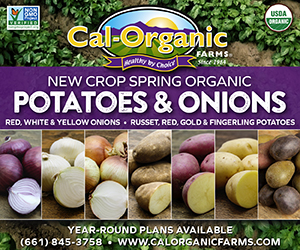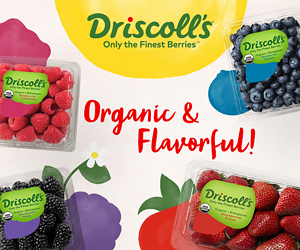CJ Buxman, former president of Fruit World, has relaunched the marketing arm of Sunny Cal Farms, resurrecting the sales side of a farming operation his father, Carl Buxman, started in 1981.
“My wife and I recently started selling fruit under the Sunny Cal banner,” CJ said. “It was our desire to lay a foundation for our children to have an opportunity to build on in their lives. I think it’s a desire for many families with small farms to be able to have the next generation be able to carry on the family farm and have it be a blessing for them, not a burden. That is our hope with Sunny Cal—that we’ll be able to raise up the next generation in the production and movement of organic food.”

CJ Buxman, Owner, Sunny Cal Farms
Sunny Cal Farms offers fruit from CJ’s own growing operation—120 acres of organic citrus, grapes, and apricots in Fresno County—as well as five partner growers with operations in the California desert region, Central Valley, and Ventura County.
Sunny Cal’s organic citrus items include mainstays like oranges, lemons, grapefruit, and mandarins as well as specialty items such as Meyer lemons, blood oranges, Buddha’s Hand, and Minneolas. On the organic grape side of things, the company offers Thomcords, Victoria Moscatas, Kyohos, and Niabell Concords, and it also grows organic apricots.
“We’ve grown Thomcords for a number of years,” Buxman said. “Adding to that, we have the Victoria Moscata, a delicious and fragrant seedless muscat that we named after our daughter. The Victoria Moscata vineyard is still in development, and we hope to have some production in 2024. Finally, we have the Kyoho and Niabell Concord varieties, which are seeded and have the most amazing flavor and fragrance. Our apricots are European varietals, known for their beautiful red blush and early harvest dates.”
"That is our hope with Sunny Cal—that we’ll be able to raise up the next generation in the production and movement of organic food.” - CJ Buxman
Buxman grew up in a farming family in California’s Central Valley. “We didn’t have a generational farming business or land that was handed down, but my grandfather was a farmer,” he said. “My father grew up farming but became a high school teacher until the age of 40, when he decided to start his own farming operation. I grew up learning all aspects of his business, which was the original Sunny Cal Farms. I spent the most time in the packinghouse, especially during the summers when I was young.”
While Buxman’s father wanted him to take over the family business, his mother was not so keen on the idea—she thought farming was too difficult of an occupation. So CJ ended up getting degrees in computer engineering and accountancy, though he ran the family’s packinghouse while in school. “That was a great experience because it gave me a solid foundation of retail packaging requirements, quality control, and balancing the relationship between growers and sales,” he said.

Buxman’s father’s company went out of business in the late 2000s, and CJ pursued a career in wealth management and later technology consulting, which kept him in suits and glued to a computer. It didn’t take long before he realized the office lifestyle was not for him, so after several years, he, along with his wife and first child, decided to get back into ag.
“I asked a Reedley landowner, whose money I managed in the stock market for a couple years after the family business went under, if he would be open to me leasing his 15 acres of oranges,” Buxman recalls. “He said yes; we wrote out a contract on a napkin; and we moved three hours back to my hometown to start farming. I applied for the FSA (Farm Service Agency) beginning farmer loan program, which gave me the funding to farm. Over the course of 10 years, I leased and purchased over 100 acres. I dreamed about my time in the old Sunny Cal packinghouse, with exposure to all the different commodities, so I leased and planted apricots, table grapes, oranges, mandarins, and peaches, a diverse small farming operation.”
When he first returned to ag, Buxman was farming conventionally as that’s all he knew. However, at home, his family was eating an exclusively organic diet. “As a proud farmer, I remember bringing home our family crops, but the fruit would not get eaten,” he said. “My wife, with a grin, would ask me if it was organic, and of course my answer was no. After a few years of this, I realized that we really needed to be farming the way we were eating. We started our organic certification with one ranch, then another, until we transitioned all that we grow to organic.”

Sunny Cal Farms is just starting to build out its customer base, which currently includes wholesalers in the Bay Area, Southern California, and Pacific Northwest.
As for his future plans for the company, Buxman said, “We’d like to continue rounding out our table grape and citrus programs, both on the farming side and the grower side. As we’re building the foundation of Sunny Cal in 2024, we’ll be attentive to the needs of our growing customer base and work to adapt to meet those needs. For now, we’re focusing on building a foundation for the venture, which will take time.”
"I realized that we really needed to be farming the way we were eating. We started our organic certification with one ranch, then another, until we transitioned all that we grow to organic." - CJ Buxman
In reflecting on the state of the organic produce industry overall, Buxman said he’s “excited to see more and more organic offerings coming to market” as well as more conventional growers creating organic programs. However, he noted that this does pose a risk to smaller organic growing operations, the very types of farms that formed the foundation of the organic movement.
“The economies of scale and growing demand for a ‘one stop shop’ (where a truck can come to a shipper and get fully loaded with both conventional and organic offerings all in one place) favor the large, mainstream corporate farms,” he said. “As organic production has increased overall, retailers have trended towards less flexibility in sizing from their organic suppliers, which also favors the large corporate conventional shippers who offer organic items.”
However, Buxman said this dynamic also opens up a unique opportunity for smaller organic farms to emphasize the stories behind their fruit to consumers. “I think that, if done well, this can create a strong value proposition for retailers to continue to keep the heart in organic produce,” he said. “I think storytelling through packaging, in-store signage, digital media—and, of course, a great eating experience—are all ways that smaller family farms can connect to the end customer.”






